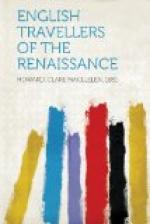There had always been a protest against foreign influence, but in the eighteenth century one cannot fail to notice a stronger and more contemptuous attitude than ever before. England was feeling her power. War with France sharpened the shafts of satire, and every victory over the French increased a strong insular patriotism in all classes. Foote declared residence in Paris a necessary part of every man of fashion’s education, because it “Gives ’em a relish for their own domestic happiness and a proper veneration for their own national liberties."[379] His Epilogue to The Englishman in Paris commends the prudence of British forefathers who
“Scorned to truck for
base unmanly arts,
Their native plainness and
their honest hearts."[380]
It was not the populace alone, or those who appealed directly to the populace, who sneered at Popish countries, and pitied them for not being British.[381] As time went on Whigs of all classes boasted of the superiority of England, especially when they travelled in Europe.
“We envy not the warmer
clime that lies
In ten degrees of more indulgent
skies ...
’Tis Liberty that crowns
Britannia’s Isle
And makes her barren rocks
and her bleak mountains smile."[382]
Addison’s travels are full of reflections of this sort. The destitution of the Campagna of Rome demonstrates triumphantly what an aversion mankind has to arbitrary government, while the well-populated mountain of St Marino shows what a natural love they have for liberty. Whigs abroad were well caricatured by Smollett in Peregrine Pickle in the figures of the Painter and the Doctor. They observed that even the horses and dogs in France were starved; whereupon the Governor of Peregrine, an Oxonian and a Jacobite, sneered that they talked like true Englishmen. The Doctor, affronted by the insinuation, told him with some warmth that he was wrong in his conjecture, “his affections and ideas being confined to no particular country; for he considered himself as a citizen of the world. He owned himself more attached to England than to any other kingdom, but this preference was the effect of reflection and not of prejudice.”




